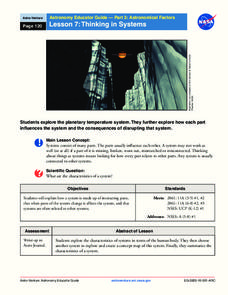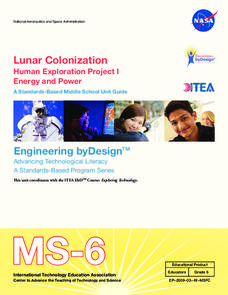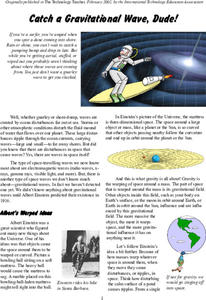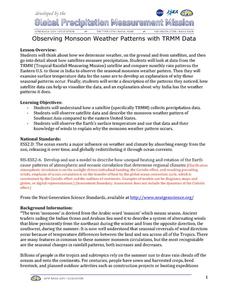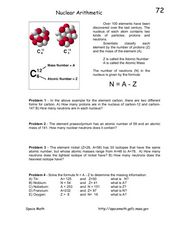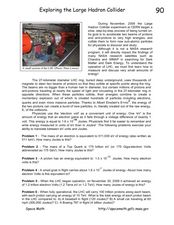NASA
Freshwater Availability Classroom Activity
This science assignment produced by NASA teaches inquiring minds the distribution of Earth's water. Learners will appreciate and understand the importance of fresh water and how weather and climate affects everything.
NASA
Cleaning Water
Give young scientists a new appreciation of fresh, clean drinking water. After learning about the ways astronauts recycle their air and water, your class will work in small groups creating and testing their very own water filtration...
Curated OER
Organic Molecules Detected on Distant Planet!
Here is a planet worksheet in which learners read about organic molecules detected through spectral lines of the planet Osiris. They calculate the mass, the volume and the densities of common ingredients for planets including Osiris and...
NASA
Astronomy Mission Module
Yes, scientists say, there is other life in our solar system! And the best place to look is on Europa, a moon of Jupiter. Here, learners mimic the techniques scientists use to gather information about objects in our solar system, write...
Curated OER
Our Solar System - Comparing Planetary Travel Distances
NASA presents a mini-unit on distances in our solar system. It incorporates scientific concepts of gravity, mass, density, and payload while your aspiring astronauts also employ mathematics skills. They calculate speed, they determine...
Curated OER
Lakes of Methane on Titan
In this methane lakes activity, students read about the false-color synthetic radar map taken by the Cassini spacecraft indicating methane lakes on Titan. Students solve 4 problems about the surface area of the lakes from the image, and...
NASA
Lunar Colonization
A five-lesson unit challenges teams to design a complex to allow people to colonize the Moon. The teams first work in order to understand the challenge before becoming experts. Expert teams learn about different aspects needed to survive...
NASA
Catch a Gravitational Wave, Dude!
It is cowabunga time! Pupils read an article about the NASA LISA mission on gravitational waves and conduct additional research on them. The class participates in a science bowl type competition about gravitational waves. Panels of four...
Chicago Botanic Garden
Unit 2 Pre-test, Grades 7– 9
This pre-assessment launches a unit on climate change and weather. 15 questions, both short answer and multiple choice, asses the classes' knowledge about these concepts.
Curated OER
Single Event Upsets in Aircraft Avionics
In this aircraft avionics worksheet, science fans read about the first unmanned air vehicle that collects data about the Earth and is subject to damage by cosmic ray showers. Pupils analyze two graphs of data showing the neutron flux vs....
NASA
Cosmic Times 2019
NASA is planning a journey to Mars, and current scholars could very well be a part of a future mission. During the unit, pupils research the advances in space exploration and knowledge about the universe. Then they work in groups to...
NASA
Observing Monsoon Weather Patterns with TRMM Data
Follow a fabulous slide show on how monsoons form and how satellite technology is being used to observe the phenomena, explaining why they occur. Afterward, visit the TRMM (Tropical Rainfall Measuring Mission) website to access actual...
Curated OER
Nuclear Arithmetic
In "Nuclear Arthmetic," first-time physical scientists examine atomic structure and the periodic table of elements. The are given the formula, "N = A-Z," in which N is the number of neutrons, A is the atomic mass, and Z is the atomic...
Curated OER
Parts Per Hundred (ppH)
In this parts per hundred worksheet, students read about describing components of a population by parts per a given number such as 100, 100 or 1 million. Students are given 6 problems to calculate the parts per hundred for each sample...
NASA
Design a Crew Exploration Vehicle
Make a splash from space. Participants use the engineering design process to create a waterproof space exploration vehicle capable of an upright landing. Young engineers test and modify designs as needed and participate in a group...
NASA
Data Literacy Cube: Global Atmospheric Temperature Anomaly Data
Evaluate global temperature anomalies using real-world data from NASA! Climatologists analyze a data set using a literacy cube and differentiated question sheets. Team members evaluate global temperature anomaly data with basic...
Chicago Botanic Garden
Recognizing Change (Observation vs. Inference)
What is the difference between making inferences and making observations? Young climatologists refer to a PowerPoint to make observations on each slide. They record their observations in a provided worksheet before drawing a...
NASA
Write the Book on Weather Metrics
It's not easy to measure the weather. Pupils learn about what all weather has in common—the atmosphere. Scholars discover how a meteorologists must be able to measure aspects of the atmosphere and decipher the data. They then create a...
Curated OER
Exploring the Large Hadron Collider
On this physics handout, pupils read about the Hadron Collider used to make new sub-atomic particles by accelerating protons. They solve 6 math problems that include translating electron volts to Joules. This is geared toward high school...
Common Core Sheets
Reading a Timeline
Sometimes the most important details of an informational text aren't within the text at all. Teach your class how to read timeline with a set of activities that prompts them to find specific dates and events on the timelines, as well as...
Chicago Botanic Garden
Food for Thought: Climate Change and Trophic Cascades
Learners examines the arctic food web with a short video about polar bears and an article about bears and warming temperatures. They design an arctic food web and discuss the trophic cascade that could come from climate change.
International Technology Education Association
Become a Weather Wizard
Accurate weather forecasting is something we take for granted today, making it easy to forget how complex it can be to predict the weather. Learn more about the terms and symbols used to forecast the weather with an earth science lesson...
Curated OER
What's the Frequency, Roy G. Biv?
Introduce starting space scientists to the electromagnetic spectrum, expecially the portion of visible light. Teach them about wavelength and frequesncy. Then give them a roll of adding machine tape and a manila folder to make a...
Curated OER
Background Radiation and Lifestyles
In this radiation and lifestyles worksheet, students are given 5 problems about a person which indicate her exposure to radiation. Students calculate her total dosage to radiation in each problem based on her exposure.





